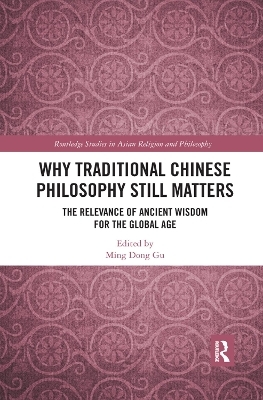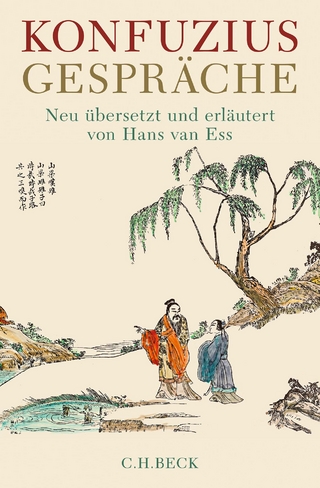
Why Traditional Chinese Philosophy Still Matters
Routledge (Verlag)
978-0-367-35612-5 (ISBN)
- Titel z.Zt. nicht lieferbar
- Versandkostenfrei innerhalb Deutschlands
- Auch auf Rechnung
- Verfügbarkeit in der Filiale vor Ort prüfen
- Artikel merken
Traditional Chinese philosophy, if engaged at all, is often regarded as an object of antiquated curiosity and dismissed as unimportant in the current age of globalization.
Written by a team of internationally renowned scholars, this book, however, challenges this judgement and offers an in-depth study of pre-modern Chinese philosophy from an interdisciplinary perspective. Exploring the relevance of traditional Chinese philosophy for the global age, it takes a comparative approach, analysing ancient Chinese philosophy in its relation to Western ideas and contemporary postmodernist theories. The conversation extends over a broad spectrum of philosophical areas and themes, ranging from metaphysics, hermeneutics, political theory, religion and aesthetics to specific philosophical schools including Confucianism, Daoism, and Buddhism. By engaging many time-honoured philosophical issues from a comparative perspective, this book bridges the gap between Eastern and Western thought and emphasises the need for a newly fortified global humanism and a deeper appreciation of different philosophical and religious values in an age gripped by large-scale crises.
Arguing that traditional Chinese philosophy has immediate relevance to the many challenges of modern life, this book will be useful to students and scholars of Asian Philosophy and Asian Studies in general.
Ming Dong Gu is Professor of Comparative Literature at the University of Texas at Dallas. His recent publications include Sinologism: An Alternative to Orientalism and Post-colonialism (2013) and Translating China for Western Readers: Reflective, Critical, Practical Essays (editor, 2015).
Introduction: Why Traditional Chinese Philosophy Still Matters? Part I: Relevance of Confucian Ethics for Our Time 1. Confucian Role Ethics, Roger T. Ames 2. A Theory of Truthfulness (Cheng) in Classical Confucian Philosophy, Chung-ying Cheng 3. Why Does the Book of Rites Still Matter in Contemporary China? A Case Study of the Relevance of Tian Di 天地to the Age of Globalization, Xinzhong Yao 4. Moral Luck and Moral Responsibility: Wang Yangming on the Confucian Problem of Evil, Yong Huang Part II: Mutual Empowerment of Chinese and Western Thought 5. Responsive Virtuosity: A Classical Chinese Buddhist Contribution to Contemporary Conversations of Freedom, Peter Hershock 6 .Translatability, Strangification and Common Intelligibility, Vincent Shen 7. Confucian Exegesis, Hermeneutic Theory, and Comparative Thought, On-cho Ng 8. Spontaneity and Reflection, Richard Shusterman Part III: Modern Illuminations of Ancient Wisdom 9. Chinese Philosophy’s Hybrid Identity, John Makeham 10. 'Knowing, Feeling, and Active Ignorance: Methodological Reflection on the Study of Chinese Philosophy, Carine Defoort 11. Why the Yijing (Classic of Changes) Matters in an Age of Globalization, Richard J. Smith 12. Understanding Zen/Chan in the Context of Globalization, Ming Dong Gu 13. Afterword: Comments and Reflections by An ‘Outsider’, J. Hillis Miller
| Erscheinungsdatum | 13.06.2019 |
|---|---|
| Reihe/Serie | Routledge Studies in Asian Religion and Philosophy |
| Zusatzinfo | 3 Line drawings, black and white; 3 Illustrations, black and white |
| Verlagsort | London |
| Sprache | englisch |
| Maße | 156 x 234 mm |
| Gewicht | 470 g |
| Themenwelt | Geisteswissenschaften ► Philosophie ► Östliche Philosophie |
| ISBN-10 | 0-367-35612-0 / 0367356120 |
| ISBN-13 | 978-0-367-35612-5 / 9780367356125 |
| Zustand | Neuware |
| Haben Sie eine Frage zum Produkt? |
aus dem Bereich


